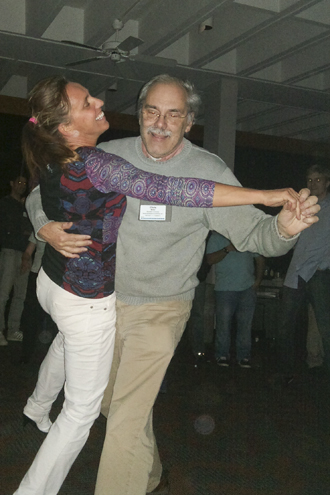Nobelist MacKinnon '78 speaks at science retreat
Chemistry researcher talks of his work and his Brandeis years

Dorothee Kern and Chris Miller of the biochemistry department at this year's retreat.
More than one hundred Brandeis scientists – undergraduates, graduate students, postdoctoral fellows and faculty – braved the wind and rain to reach Woods Hole last week for the annual Biochemistry, Biophysics and Quantitative Biology Retreat, hosted at the Marine Biology Laboratory.
The keynote speaker for this year was Roderick MacKinnon ‘78, a Brandeis alum and a 2003 Nobel Laureate in Chemistry.
MacKinnon’s much anticipated talk was delivered on the subject of eukaryotic K+ channels, the molecules responsible for the movement of potassium ions into cells. This capability places K+ channels at the center of controlling all electrical phenomena in cells, such as the waveform of the heartbeat, the frequency of nerve impulses in the brain and the cleaning of the blood by the kidney.
MacKinnon’s lecture on these channels was a fine blend of humility and deep appreciation of the intricate and exquisite modes of action of such channels.
Equally remarkable was his journey towards science. Having temporarily foregone a scientific career in favor of one in medicine, MacKinnon returned to Chris Miller’s lab in the biochemistry department in 1986 to conduct postdoctoral studies. He credits much of his development as a scientist to Miller’s mentoring style and him “having lots of fun in his daily life…. The memory of this stayed with me.”
Since its inceptionin 2004, the retreat has become a staple of the Brandeis scientific community, growing from a scientific meeting for the biochemistry department to one that incorporates biologically relevant physics and chemistry, nearly doubling in size along the way.
Professor of Biochemistry Daniel Oprian, who organized the first retreat, says he did so because “we needed a retreat...to train our young scientists.” This has remained the mantra of the retreat, at which all material presented by Brandeis students and post-doctoral fellows.
This year, attendees were treated to 20 talks ranging from computer simulations aimed at understanding HIV capsid assembly to single-molecule visualization of formin kinetics. As further stimulation for the scientific psyche, 47 posters were on display, the highest number to date. The poster session was followed by a lobster dinner, a dance party and closing talks the following day.
Miller’s attention to students, sharp mind and dry humor were qualities shared by many of his colleagues at the retreat, who were keenly engaged in students’ talks and posters throughout the event.
Equally engaging was the quality and diversity of research presented. “I felt encouraged and really appreciated the science. It made me want to come home and make a grand plan on how to finish my Ph.D. well,” said Clarisse van der Feltz, a third-year graduate student in the Biochemistry/Biophysics Program.
MacKinnon, who received an honorary doctor of science degree from Brandeis in 2005, shared her enthusiasm. “I thoroughly enjoyed the retreat for all the scientific interactions,” he said. “I was extremely impressed by the high quality of the science presented by the graduate students and postdocs and the level of enthusiasm they conveyed.”
Asked how science has changed since the days he was an undergraduate and later a postdoc here, MacKinnon replied:
“I was an undergraduate in the 70s when Brandeis biochemistry basically led the way in mechanistic enzymology. It was still great but evolving when I returned as a postdoc in the ‘80s, and now the quality of biochemical research at Brandeis is as high as it ever was. It is impressive to see the range of physical methods being used at the highest level to study the chemistry of life. And this subject is more important now than ever because we can actually see the molecules, where the atoms are and begin to understand how they move in ways that will lead to important medical applications.”
The authors are graduate students in the Biochemistry/Biophysics Program.
Categories: Research, Science and Technology






